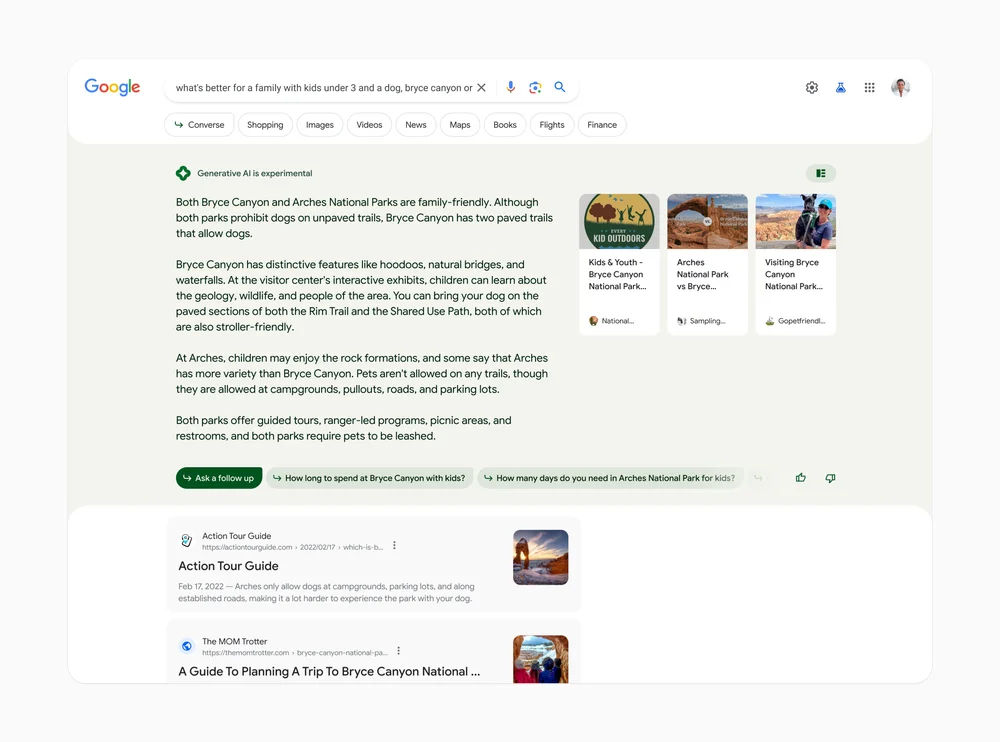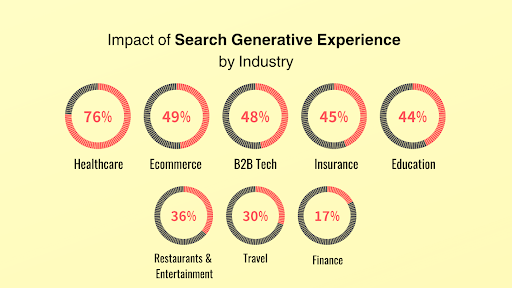A new fear has spread through SEO circles since OpenAI launched ChatGPT and baffled the world with its capabilities. Now, Google is starting with the Search Generative Experience. - Is this the end of SEO as we know it? Or is this essentially the death of SEO?
We always knew technology would keep evolving and Google would follow suit. But perhaps we weren’t as ready for these drastic changes as we thought.
That’s why panic is silently brewing across various industries, and everyone is looking for a shortcut to adapt to these transformations. Although you can’t bypass all the generative AI novelties, you can learn how they work and what that may mean for your business.
Google I/O ’24 developer conference has shown that Google went all in on AI. But the speakers also shared exciting details about Search Generative Experience, hinting at its impact on SEO.
This comprehensive article is your best shortcut to understanding the new search experience and how to make it work for you.
What is Search Generative Experience?
Search Generative Experience is also known as AI overviews and uses generative AI to provide more contextual, informative, and concise search results. The new functionality streamlines information retrieval and decision-making for users through curated snapshots of vital information related to their queries.
With the new search experience, AI will suggest the next steps and include follow-up questions while maintaining context. This theoretically allows you to explore the topic seamlessly and check diverse perspectives.
Google announced these new capabilities in May 2023, promising that the engine remains committed to driving traffic to websites across the web and upholding transparency in advertising.
How Does Search Generative Experience Work in Practice?
Search Generative Experience includes essential factors to consider, making it easier to grasp the topic, which means AI now does all the research for you. You can click links to supporting resources to verify information and explore further.
So far, SGE has three modes:
- Collapsed: Shows a shortened AI-generated answer.
- Opt-in: Users need to ask for an AI-generated answer.
- None: The query doesn’t activate SGE.
Let’s break down how AI Overviews actually work.
Organized Results
- Categorized Information: Information is organized into categories, making it easier to find what you need.
- Relevant Content: SGE prioritizes the most relevant content, putting helpful and on-topic results to the forefront.
Easier Follow-Up
- Follow-Up Suggestions: After the initial overview, SGE suggests follow-up questions to refine your search or explore new directions.
- Context Maintenance: AI maintains context from previous queries to save you from repeating yourself.
- Conversational Mode: Clicking on follow-up questions takes you to a conversational mode, where relevant information appears at the top.
Multistep Reasoning
- Complex Queries: SGE handles complex queries by breaking them down into manageable parts and providing step-by-step insights.
- Detailed Exploration: AI offers detailed overviews with additional links and resources when your queries require deeper exploration.
Planning and Decision-Making
- Decision Support: When making decisions, such as planning a vacation, SGE provides detailed comparisons and crucial considerations.
- Next Steps: Suggestions for next steps help guide your planning process, offering practical advice and follow-up questions. Keep in mind that, for now, this function is only available for meals and traveling. However, Google will expand it to party, day, and workout planning.
Vertical Experiences
- Product Snapshots: For product searches, SGE generates snapshots with key factors, product options, reviews, ratings, prices, and images.
- Shopping Graph: Built on Google’s Shopping Graph, SGE ensures up-to-date information from an extensive dataset.
Local Searches
- Local Insights: AI Overviews provide context about local places, enabling you to compare and explore your options without reading an article or watching a YouTube video.
Search Ads
- Ad Integration: Search ads continue to appear in dedicated ad slots, distinguished from organic results.
- Transparency: AI labels ads as Sponsored tags to maintain transparency.
Creativity and Productivity
- Image Generation: AI Overviews may spark your creativity by allowing you to create images based on prompts.
- Video Function: Although not necessarily a creative capability, SGE will soon allow you to make video queries, such as filming your desk and asking AI whether it remembers seeing your glasses. This is a part of Google’s Project Astra, which aims to turn AI into your everyday assistant that processes multimodal information.
These capabilities help create an integrated UI with easy-to-access resources and recognizable links.
Search Generative Experience Example
Imagine planning a vacation for your family, which includes children under three and a dog. You’re deciding between Bryce Canyon and Arches National Park, so you type: “What’s better for a family with kids under three and a dog, Bryce Canyon or Arches?”
Your Search Generative Experience may go like this:

AI-Generated Snapshot
- The Search Generative Experience processes your query using generative AI, providing a snapshot with key highlights of both parks, focusing on family-friendly amenities, pet policies, pros and cons, and links to detailed articles.
Suggested Next Steps
The AI suggests follow-up questions like:
- How long do you plan to spend at Bryce Canyon with kids?
- Best trails for families in Arches National Park.
- Pet-friendly accommodations near Bryce Canyon.
Clicking on these questions allows deeper exploration.
Maintaining Context
- If you click “How long to spend at Bryce Canyon with kids,” the AI remembers your context and includes relevant tips, such as ideal visit duration, child-friendly activities, and pet-friendly facilities.
Exploring Perspectives
- The AI includes links to sources like travel blogs, park websites, and user reviews, showing different viewpoints and experiences.
Product Recommendations
- For purchasing decisions, the AI provides snapshots of relevant products, like travel strollers or pet-friendly hotels near Arches National Park, with reviews, prices, and purchase links.
This approach helps you understand and navigate every topic faster and compare different options. You can even use the Add to Sheets function to put search results directly into a spreadsheet for sharing and organizing, which is excellent for trip planning and info tracking.
So far, so good, right? Well, we said it – in theory. While SGE may be terrific for regular users, SEO professionals might not have the same luck.
Search Generative Experience: Impact on SEO
Here’s how AI Overviews could affect SEO.
SGE and Organic Traffic
Google aims to help users get information and plan activities directly in search results, reducing the need for unnecessary clicking. However, this means a lot of traffic may not reach your website. Although Google announced that the search engine is still committed to connecting users to rich and vibrant web content, SGE will help users quickly find a topic overview, transforming the traditional web journey. Since its snapshots will take priority over organic search results, SGE will start acting almost like an answer engine.
A recent Adweek article reports that AI Overviews could upend over 60 percent of publishers’ total organic traffic. Meanwhile, Insight Partners found that search traffic could decline by 25 percent because AI overviews provide a synthesis of various sources and meaningful context.
SGE and SERP Ranking Competition
Ranking high in SERPs has always been among the top priorities in SEO, but it will be imperative when only the first five results appear in AI snapshots. This means SEO is becoming a fierce battleground, as every business will compete to be a part of AI answers, featured snippets, and recommendations.
However, ranking for simple question-based keywords might be an advanced challenge. Users will likely get all the answers they need in SGE, often resulting in zero-click searches.
SGE and Impact on Different Industries
According to Search Engine Land, SGE will impact the following industries more than others:

- Healthcare: 76 percent of queries
- Ecommerce: 49 percent of queries
- B2B Tech: 48 percent of queries
- Insurance: 45 percent of queries
- Education: 44 percent of queries
- Restaurants: 36 percent of queries
- Entertainment: 36 percent of queries
- Travel: 30 percent of queries
- Finance: 17 percent of queries
Keep in mind that the shift will likely be the greatest for those centering their content around helping people plan an activity. Moreover, Google may prioritize businesses with the highest number of positive Google reviews, as its AI will generate answers based on quality information. This could endanger smaller and new companies and create feast or famine outcomes.
Search Generative Experience Optimization
No one can escape the future, and AI Overviews are already becoming our present. The only approach you can take is Search Generative Experience adoption.
Here are our tips on how to optimize SEO for SGE.
1. Refine Your SEO Strategy Instead of Giving Up on It
SGE is forcing SEO to evolve and pay more attention to authority, expertise, user intent, and context. Assessing keyword difficulty and search volume is no longer enough. Direct your efforts toward understanding your audience on a higher level instead of solely aiming to sell a product or a service.
Explore the array of keywords they may use while trying to solve a problem or find information. Focus on becoming a thought leader on niche topics and target long-tail keywords. Encompass all the relevant subjects that may interest your audience and respond to different intents with SEO topic clusters.
Since SGE allows follow-up questions and in-depth topic exploration, it will likely prioritize multifaceted answers. To align with this, take a comprehensive approach that balances human and AI-generated content. Another thing to remember is that SGE is in its infancy stage, and its algorithms and requirements are still developing. The best way to stay ahead of changes is to keep up with upcoming AI and SEO trends.
2. Strengthen Your Business Credibility
Unlike traditional search results, SGE will offer an opinion in the form of pros and cons, meaning it will evaluate your brand relevance and quality. While doing so, it will pay attention to details, meaning five-star ratings are becoming a must-have.
Regardless of your industry and offering, you should encourage your customers and clients to rate and recommend your business. Show your professionalism by responding to all reviews.
Focus on getting your business name out there, as branded traffic could be the saving grace as you adapt to SGE. Optimize your Google Business Profile, ensuring up-to-date info, accurate location, and high-quality pictures.
3. Optimize for Voice Search
Voice searches may become more common, requiring you to prioritize natural language. Think of complex industry-related questions your customers may ask and build content around them.
However, some may use conversational language in voice searches, resulting in simpler, direct sentences.
4. Don’t Forget Structured Data
Structured data could help AI understand the content of your webpage better, making it more likely to be included in its snapshots. Moreover, it provides detailed information, which can lead to rich snippets, vital for engaging and informative SGE displays.
Remember to use Schema Markup, keep up with updates, and leverage tools like Google’s Structured Data Testing Tool to check for errors.
The Era of Black Box Search
We’re navigating uncharted territories, as SGE is still unavailable in Europe and is continually evolving. However, we can anticipate its potential impact on the user’s web journey and characteristics that could elevate your content to AI Overviews.
Currently, Google aims to do the Googling for you, yet AI requires reliable sources to construct its summaries and recommendations. The most effective approach to appeal to AI is to create expert, comprehensive content that caters to various user intents. This means you shouldn’t leave your SEO strategies behind. But you may consider collaborating with professionals who offer SEO services; they can assist you in navigating the era of black box search.





